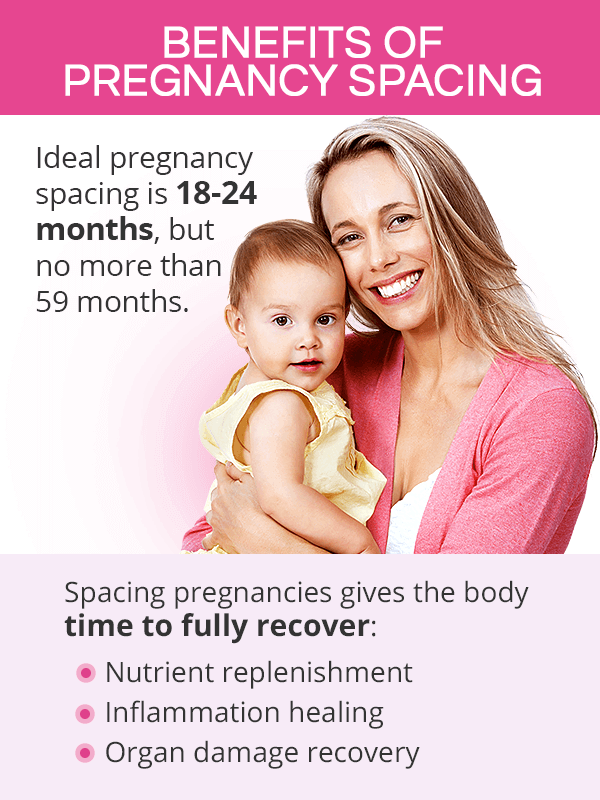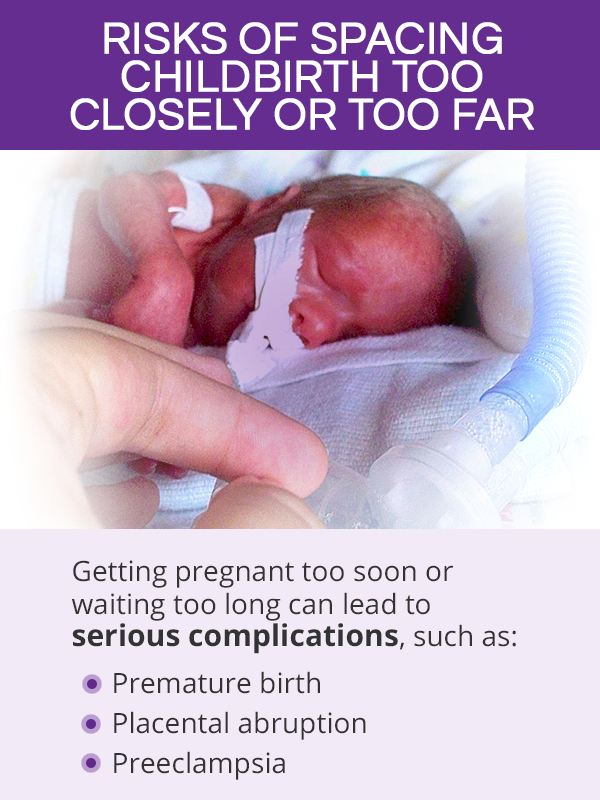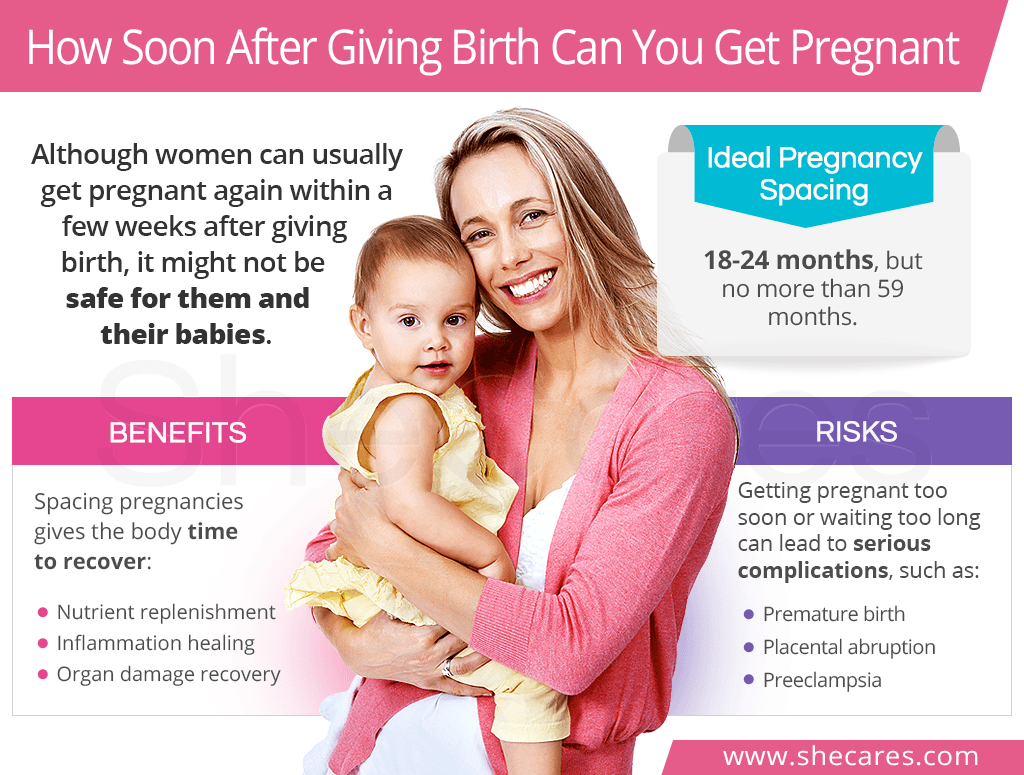What is Pregnancy Spacing?

Pregnancy spacing, also called birth spacing or interpregnancy interval (IPI), is defined as the number of months between giving birth and getting pregnant again.
Ideal Birth Spacing
Numerous studies have analyzed the progression of pregnancies with various intervals in between them. They found that pregnancy spacing between matters a great deal as it dramatically affects the health of the baby and mother.
The best pregnancy outcomes have been observed among women who waited between 18 to 24 months but not longer than 59 months before getting pregnant again. It included both vaginal births as well as Cesarean deliveries.
Recommendations for pregnancy spacing over 35 are generally shorter due to a natural fertility decline with age. Women past their mid-30s are typically advised to wait 12 months before getting pregnant with another child.
Why is Pregnancy Spacing Important?
Although science is not exactly sure why not keeping the recommended gap between two pregnancies has been linked to adverse outcomes, the most probable effects of waiting before subsequent pregnancies include the following ways in which the body reaches full recovery:
Replenishing the nutrients. Pregnancy is known to be nutritionally draining for a woman's body, especially in terms of folate levels. The body needs time to rebuild its reserves, often as long as a year, in order to prevent pregnancy complications that have been associated with nutritional deficiencies, including spina bifida.
Healing from inflammation. Infections and inflammations in various body parts are relatively common during and after birth as the body goes through various changes to return to its pre-pregnancy state. Conceiving too soon with ongoing inflammation or an infection may lead to various complications during pregnancy.
Recovering from organ damage. Childbirth takes a toll on the genital tract, including the uterus and pelvic floor muscles. Getting pregnant before the organs and tissues have a chance to properly heal might not allow the body to support the demands of another pregnancy.
Risks of Spacing Childbirth Too Closely or Too Far

It is estimated that one in every three women do not wait long enough before getting pregnant again, while others wait too long.
Studies have shown that getting pregnant in the first 6 months since giving birth carries the highest risks of complications that may affect the health of the mother and the baby alike.
Conceptions taking place between the 6th and 17th month as well as after the 60th month since previous pregnancy also carry considerate risks of adverse outcomes, but to a slightly lesser extent than those occurring in the first six months.
These complications include the following:
- Premature birth
- Low birth weight
- Small size for gestational age
- Congenital disorders
- Autism
- Schizophrenia
- Placental abruption
- Uterine rupture
- Anemia
- Preeclampsia
- Labor dystocia
- Gestational diabetes
Key Takeaways
It is common for couples to want to minimize age gaps between subsequent children. However, the question of how soon after giving birth can you get pregnant again should be analyzed not only in terms of a woman's ability to conceive following childbirth, but - most importantly - in terms of the potentially serious health consequences of getting pregnant too fast or waiting too long.
The current pregnancy spacing recommendation is to wait at least 18 months, but not more than 59 months, before getting pregnant again. The highest risk of pregnancy complications have been observed in conceptions that took place in the first 6 months since giving birth. Women who conceive between the 6th and 17th month and those who get pregnant 60 months after birth are also at a higher risk of complications, but slightly less than the other group. As such, knowledge of the benefits of ideal birth spacing is essential to optimal health of the mother and the baby alike.
Sources
- American Journal of Obstetrics and Gynecology. (2015). The effect of a very short interpregnancy interval and pregnancy outcomes following a previous pregnancy loss. Retrieved February 26, 2019 from https://www.ncbi.nlm.nih.gov/pubmed/16622143/
- JAMA. (2006). Birth spacing and risk of adverse perinatal outcomes: a meta-analysis. Retrieved February 26, 2019 from https://www.ncbi.nlm.nih.gov/pubmed/16622143/
- March of Dimes. (2017). How Long Should You Wait Before Getting Pregnant Again? Retrieved February 26, 2019 from https://www.marchofdimes.org/pregnancy/how-long-should-you-wait-before-getting-pregnant-again.aspx
- Mayo Clinic. (2017). Family planning: get the facts about pregnancy spacing. Retrieved February 26, 2019 from https://www.mayoclinic.org/healthy-lifestyle/getting-pregnant/in-depth/family-planning/art-20044072
- Obstetrics & Gynecology. (2013). Short interpregnancy intervals in the United States. Retrieved February 26, 2019 from https://www.ncbi.nlm.nih.gov/pmc/articles/PMC3749871/
- Obstetrical and Gynecological Survey. (2012). Interpregnancy Interval and Obstetrical Complications. Retrieved February 26, 2019 from https://journals.lww.com/obgynsurvey/Abstract/2012/09000/Interpregnancy_Interval_and_Obstetrical.18.aspx
- The Journal of Obstetrics and gynecology research. (2008). Interpregnancy interval and subsequent perinatal outcomes among women delaying initiation of childbearing. Retrieved February 26, 2019 from https://www.ncbi.nlm.nih.gov/pubmed/19012690/


